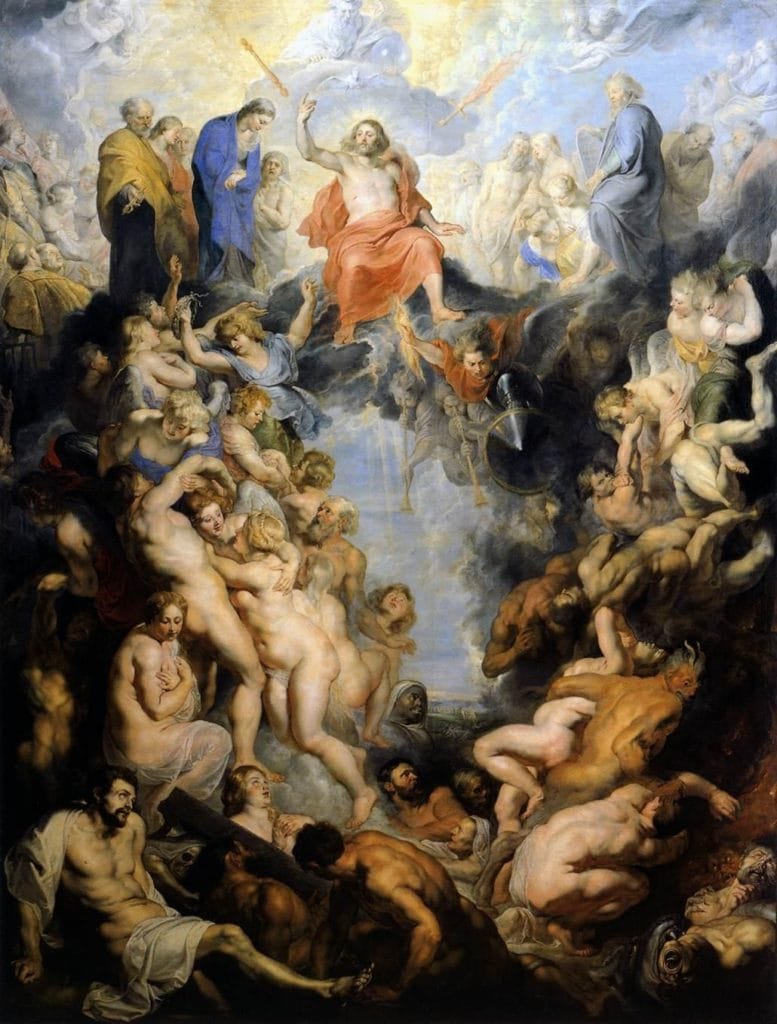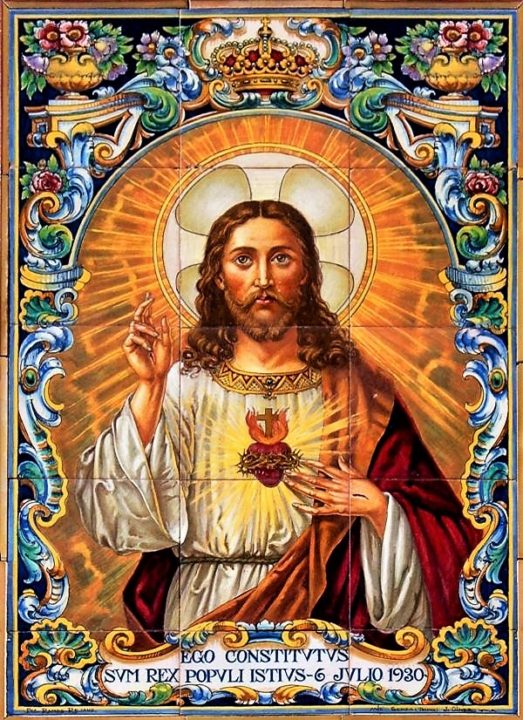CHRIST THE KING SUNDAY GOSPEL, REFLECTION AND HOLY MASS: THE LAST JUDGMENT (Mt 25:31–46).

Jesus said to his disciples: “When the Son of Man comes in his glory, and all the angels with him, he will sit upon his glorious throne, and all the nations will be assembled before him. And he will separate them one from another, as a shepherd separates the sheep from the goats. He will place the sheep on his right and the goats on his left. Then the king will say to those on his right, ‘Come, you who are blessed by my Father. Inherit the kingdom prepared for you from the foundation of the world. For I was hungry and you gave me food, I was thirsty and you gave me drink, a stranger and you welcomed me, naked and you clothed me, ill and you cared for me, in prison and you visited me.’ Then the righteous will answer him and say, ‘Lord, when did we see you hungry and feed you, or thirsty and give you drink? When did we see you a stranger and welcome you, or naked and clothe you? When did we see you ill or in prison, and visit you?’ And the king will say to them in reply, ‘Amen, I say to you, whatever you did for one of the least brothers of mine, you did for me.’ Then he will say to those on his left, ‘Depart from me, you accursed, into the eternal fire prepared for the devil and his angels. For I was hungry and you gave me no food, I was thirsty and you gave me no drink, a stranger and you gave me no welcome, naked and you gave me no clothing, ill and in prison, and you did not care for me.’ Then they will answer and say, ‘Lord, when did we see you hungry or thirsty or a stranger or naked or ill or in prison, and not minister to your needs?’ He will answer them, ‘Amen, I say to you, what you did not do for one of these least ones, you did not do for me.’ And these will go off to eternal punishment, but the righteous to eternal life.
Gospel Commentary from the Navarre Bible, Commentary to the Gospel of St. Matthew (with permission)
- 31-33 In the Prophets and in the Book of Revelation the Messiah is depicted on a throne, like a judge. This is how Jesus will come at the end of the world, to judge the living and the dead.
- The Last Judgment is a truth spelt out in the very earliest credal statements of the Church and a dogma of faith solemnly defined by Benedict XII in the Constitution Benedictus Deus (29 January 1336).
- 35-46 All the various things listed in this passage (giving people food and drink, clothing them, visiting them) become works of Christian charity when the person doing them sees Christ in these “least” of his brethren.
- Here we can see the seriousness of sins of omission. Failure to do something which one should do means leaving Christ unattended.
- “We must learn to recognize Christ when he comes out to meet us in our brothers, the people around us. No human life is ever isolated. It is bound up with other lives. No man or woman is a single verse; we all make up one divine poem which God writes with the cooperation of our freedom” (J. Escrivá, Christ is passing by, 111).
- We will be judged on the degree and quality of our love (cf. St John of the Cross, Spiritual Sentences and Maxims, 57). Our Lord will ask us to account not only for the evil we have done but also for the good we have omitted to do. We can see that sins of omission are a very serious matter and that the basis of love of neighbour is Christ’s presence in the least of our brothers and sisters.
- St Teresa of Avila writes: “Here the Lord asks only two things of us: love for his Majesty and love for our neighbour. It is for these two virtues that we must strive, and if we attain them perfectly we are doing his will. . . . The surest sign that we are keeping these two commandments is, I think, that we should really be loving our neighbour; for we cannot be sure if we are loving God, although we may have good reasons for believing that we are, but we can know quite well if we are loving our neighbour. And be certain that, the farther advanced you find you are in this, the greater the love you will have for God; for so dearly does his Majesty love us that he will reward our love for our neighbour by increasing the love which we bear to himself, and that in a thousand ways: this I cannot doubt” (Interior Castle, V, 3).
- This parable clearly shows that Christianity cannot be reduced to a kind of agency for “doing good”. Service of our neighbour acquires supernatural value when it is done out of love for Christ, when we see Christ in the person in need. This is why St Paul asserts that “if I give away all I have . . . but have not love, I gain nothing” (1 Cor 13:3). Any interpretation of Jesus’ teaching on the Last Judgment would be wide of the mark if it gave it a materialistic meaning or confused mere philantrophy with genuine Christian charity.
- 40-45 In describing the exigencies of Christian charity which gives meaning to “social aid”, the Second Vatican Council says: “Wishing to come down to topics that are practical and of some urgency, the Council lays stress on respect for the human person: everyone should look upon his neighbour (without any exception) as another self, bearing in mind above all his life and the means necessary for living it in a dignified way ‘lest he follow the example of the rich man who ignored Lazarus, the poor man’ (cf. Lk 16:18-31).
- “Today there is an inescapable duty to make ourselves the neighbour of every man, no matter who he is, and if we meet him, to come to his aid in a positive way, whether he is an aged person abandoned by all, a foreign worker despised without reason, a refugee, an illegitimate child wrongly suffering for a sin he did not commit, or a starving human being who awakens our conscience by calling to mind the words of Christ: ‘As you did it to one of the least of these my brethren, you did it to me’’’ (Gaudium et spes, 27).
- 46 The eternal punishment of the reprobate and the eternal reward of the elect are a dogma of faith solemnly defined by the Magisterium of the Church in the Fourth Lateran Council (1215):
- “He [Christ] will come at the end of the world; he will judge the living and the dead; and he will reward all, both the lost and the elect, according to their works. And all these will rise with their own bodies which they now have so that they may receive according to their works, whether good or bad; the wicked, a perpetual punishment with the devil; the good, eternal glory with Christ”.
Dear brethren in Christ, let us not forget that the decisive criterion to enter the kingdom of God is our sincere concern and love for our neighbor, especially those who are in most need, doing it for love of God who is present in each person as His image. Happy Solemnity of Christ the King.
A great day ahead. Stay safe and God bless. Fr. Rolly Arjonillo
VIDEO COMMENTARY
Topic: WHO IS THE KING OF POP, ROCK AND HAPPINESS ROLLED INTO ONE?
It is customary to end the liturgical year with the Solemnity of our Lord Jesus Christ, the King of the Universe. It was Pope Pius XI who instituted this feast as a reminder for all Christians at that time that their allegiance was to their heavenly king rather than the dictators of that age who ruled the earth. It also ushers in Advent to celebrate the arrival of the newborn king. On November 29, the Liturgical Year B, will begin.
In today’s readings (Ezekiel 34:11-12; 1 Corinthians 15:20-26,28; Matthew 25:31-46), Christ is pictured as the ruler that every ruler must bow to and the good shepherd who goes out of his way to look for one lost sheep while leaving the rest behind.
CHRIST THE KING SUNDAY YEAR A HOLY MASS
NOV. 22, 2020


